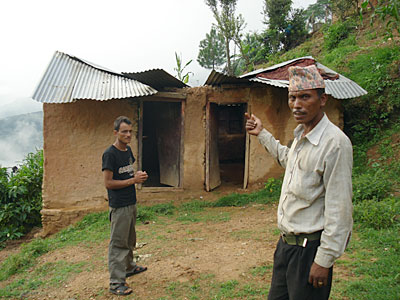 al pics: DEWAN RAI Namuna Basti, on the outskirts of Dailekh's district headquarters, is home to a community of Badis |
As soon as she gets home from work, Balsera Badi prepares dinner for her family of seven. First she breastfeeds her two-year-old daughter Maya, then puts the small package of rice bought with the day's earnings in a corner of the kitchen and asks her daughter to make a fire. "Bhaari bokna paye khwai hunchha, natra ruwai hunchha (If I get to carry a load there'll be eating, if not there'll be crying)," she says.
Balsera Badi has been living in a plastic tent with her family for the last 14 years. A 25-square-foot piece of land in Namuna Basti, a settlement at the edge of Dailekh's district headquarters, is all they own, and they don't have a deed to the land yet. "Monsoon is a real problem as the rain floods the room and we have to stay awake all night," she says. The tent is open on all four sides and even the plastic material of the roof has begun to wear.
All Badis who inhabit Namuna Basti suffer the same plight as Balsera. They used to live in Bhaire, Kalika Thum, Dullu, Belpata, Sattala, Singaudi, Naumule, and Lakandra VDCs, but moved to Dailekh since their displacement during the Maoist insurgency. "We used to entertain people by singing and dancing on different occasions or going door-to-door begging for food," says Narajit Badi, recalling how they were displaced from their homes. "But the Maoists banned all these activities and asked us to join the insurgency. We left and moved here."
Discriminated against because of their background, the Badis spent four years in Dailekh without shelter until Dekendra Raj Thapa came to their rescue in 2000. Thapa, a local journalist, negotiated with the local administration for a piece of public land for the Badis to settle on. He called it Namuna Basti, as he wanted to develop it as a model settlement. But Thapa did not live to see the realisation of his dream. In 2004, the Maoists kidnapped and murdered him.
 |
With no deeds or a representative to fight for their cause, Namuna Basti faces a bleak future. The heat makes living under tents almost unbearable by day. There is not a single toilet in the settlement due to lack of space and even a brief drizzle renders the settlement muddy and unhygienic. "We have to wait for our turn to go to the toilet even if it is in an open space," says Padam Badi. The risk of health hazards is high.
But a few lucky Badi children have made it to school. They were initially admitted into the Bal Mandir in Dailekh, as funds for a child care centre were transferred there due to a lack of administration in Namuna Basti. But Bal Mandir abandoned them. According to headmaster Guru Prasad Regmi, "We could not accommodate them in our school, so we recommended Janata School." There are now 29 Badi kids in Janata Lower Secondary School. Shata Thapa, who teaches the 22 Badi children in Grade One, says they are doing well, but adds that she is not sure how long they will come to school. Given the deep-rooted stigma they live with, and the squalor of their day-to-day life, education may be the only way out for the Badi community of Namuna Basti.
 Narajit Badi holds a picture of Dekendra Raj Thapa, a local journalist who helped the Badis acquire Namuna Basti to settle on |
|
READ ALSO:
Right livelihood



